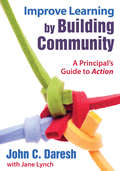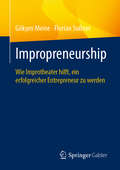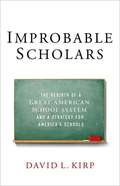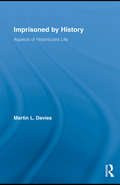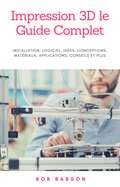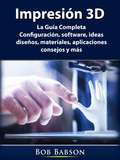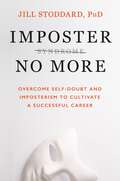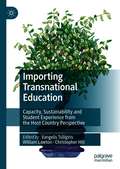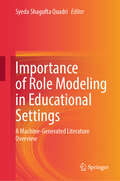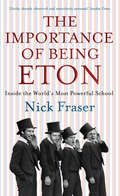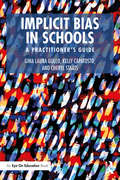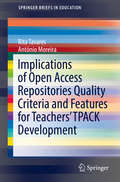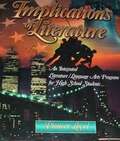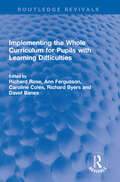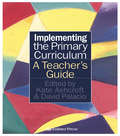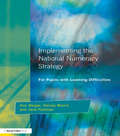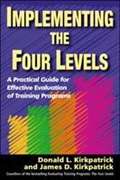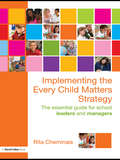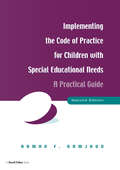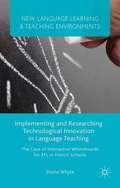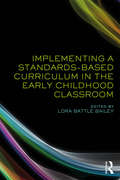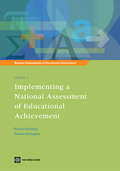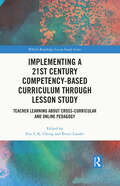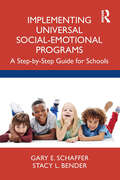- Table View
- List View
Improve Learning by Building Community: A Principal's Guide to Action
by Jane Lynch John C. DareshCreate visionary learning communities that improve student outcomes by shaping the internal school community and partnering with families and organizations in the external community.
Impropreneurship: Wie Improtheater hilft, ein erfolgreicher Entrepreneur zu werden
by Gökşen Meine Florian SußnerIn diesem Buch erfahren Sie, wie Sie sich mithilfe des Improtheaters bereits im Vorfeld auf die Selbstständigkeit einstellen können und wie Sie die Methoden anschließend bei der Gründung sowie Führung eines Unternehmens aktiv nutzen können.Denn häufig mangelt es nicht an der Idee für die eigene Unternehmung, sondern an genau der Haltung, die man als Improspieler auf der Bühne an den Tag legt: Spaß an der Herausforderung, der Reiz des Unbekannten, das spielerische Hineinschlüpfen in fremde Rollen und das Vertrauen, dass das Ganze selbst bei Fehlern und Hindernissen weitergeht. Die großen Hürden auf dem Weg zum erfolgreichen Unternehmer können somit durch die Elemente des Improtheaters an Schrecken verlieren.Die Autoren bauen eine Brücke zwischen Improtheater und Gründung und gehen der Frage nach, was Improtheater eigentlich ist und was genau einen Entrepreneur an sich auszeichnet. Das Herzstück des Buches bilden 50 leicht verständliche und praxisorientierte Übungen aus dem Improvisationstheater.Dieses Buch richtet sich hierbei nicht nur an Entrepreneure, Selbständige, Unternehmer oder Existenzgründer, sondern auch an alle, die schon länger selbständig tätig sind und sich weiterentwickeln wollen oder neuen Input suchen, um ihren unternehmerischen Horizont zu erweitern.
Improbable Scholars: The Rebirth of a Great American School System and a Strategy For America's Schools
by David L. KirpNo school district can be all charismatic leaders and super-teachers. It can't start from scratch, and it can't fire all its teachers and principals when students do poorly. Great charter schools can only serve a tiny minority of students. Whether we like it or not, most of our youngsters will continue to be educated in mainstream public schools. The good news, as David L. Kirp reveals in Improbable Scholars, is that there's a sensible way to rebuild public education and close the achievement gap for all students. Indeed, this is precisely what's happening in a most unlikely place: Union City, New Jersey, a poor, crowded Latino community just across the Hudson from Manhattan. The school district - once one of the worst in the state - has ignored trendy reforms in favor of proven game-changers like quality early education, a word-soaked curriculum, and hands-on help for teachers. When beneficial new strategies have emerged, like using sophisticated data-crunching to generate pinpoint assessments to help individual students, they have been folded into the mix. The results demand that we take notice - from third grade through high school, Union City scores on the high-stakes state tests approximate the statewide average. In other words, these inner-city kids are achieving just as much as their suburban cousins in reading, writing, and math. What's even more impressive, nearly ninety percent of high school students are earning their diplomas and sixty percent of them are going to college. Top students are winning national science awards and full rides at Ivy League universities. These schools are not just good places for poor kids. They are good places for kids, period. Improbable Scholars offers a playbook - not a prayer book - for reform that will dramatically change our approach to reviving public education.
Imprisoned by History: Aspects of Historicized Life (Routledge Approaches to History)
by Martin L. DaviesImprisoned by History: Aspects of Historicized Life offers a controversial analysis, grounded both in philosophical argument and empirical evidence, of what history does in contemporary culture. It endorses and extends the argument that contemporary society is, in historical terms, already historicized, shaped by history – and thus history loses sight of the world, seeing it only as a reflection of its own self-image. By focusing on history as a way of thinking about the world, as a thought-style, this volume delivers a major, decisive, thought-provoking critique of a crucial aspect contemporary culture and the public sphere. By illustrating the ways in which history enforces socially coercive attitudes and forms of behaviour, Martin Davies argues that history is therefore in itself ideological and exists as an instrument of political power. Contending that this ideological function is the "normal" function of professional academic history, he repudiates entirely the conventional view that only biased or "bad" history is ideological. By finding history projecting onto the world and getting reflected back at it the exacting, history-focused thinking and behaviour on which the discipline and the subject rely, he concludes that history’s very "normality" and "objectivity" are inherently compromised and that history works only in terms of its own self-interest.
Impression 3D le Guide Complet: Installation, logiciel, idées, conceptions, matériaux, applications, conseils et plus
by Bob BabsonDans ce livre, vous apprendrez tout sur l'impression 3D et son fonctionnement. Impression 3D, le guide complet : Installation, logiciel, idées, conceptions, matériaux, applications, conseils et plus Vous souhaitez acheter une imprimante 3D mais vous ne savez pas laquelle ? Vous voulez apprendre à utiliser des imprimantes 3D pour imprimer des objets et des dessins époustoufflants ? Dans ce livre, vous apprendrez tout sur l'impression 3D et la bonne méthode pour commencer. Découvrez : -Comment débuter -Quelles imprimantes 3D acheter -Les caractéristiques et capacités des imprimantes 3D + BIEN PLUS ENCORE ! Avis de non-responsabilité : L'auteur et/ou le(s) propriétaire(s) des droits ne font aucune réclamation, promesse ou garantie quant à l'exactitude, l'exhaustivité ou la pertinence du contenu de cet ouvrage, et déclinent expressément toute responsabilité pour les erreurs et omissions dans le contenu de ce dernier. Ce produit est uniquement destiné à être utilisé à titre de référence.
Impresión 3D: La Guía Completa: Configuración, software, ideas, diseños, materiales, aplicaciones, consejos y más
by Bob BabsonImpresión 3D La Guía Completa: Configuración, software, ideas, diseños, materiales, aplicaciones, consejos y más por Bob Babson En este libro aprenderá todo sobre la impresión en 3D y cómo empezar. Impresión 3D de la guía completa: configuración, software, ideas, diseños, materiales, aplicaciones, consejos y más ¿Le gustaría comprar una impresora 3D pero no tiene ni idea de cuál comprar? ¿Le gustaría aprender a utilizar las impresoras 3D para imprimir objetos y diseños sorprendentes? En este libro aprenderá todo sobre la impresión en 3D y cómo empezar. Aprende: -Cómo empezar -Qué impresoras 3D comprar -Características y capacidades de las impresoras 3D + MUCHO MÁS! Descargo de responsabilidad: Este autor y/o propietario(s) de derechos no hace reclamos, promesas o garantías sobre la exactitud, integridad o adecuación de los contenidos de este libro, y expresamente niega responsabilidad por errores y omisiones en los contenidos dentro de este libro. Este producto es sólo para uso de referencia.
Imposter No More: Overcome Self-Doubt and Imposterism to Cultivate a Successful Career
by Jill, PhD StoddardA personal and professional guide to the latest research on imposterism and psychological flexibility, IMPOSTER NO MORE is the professional&’s handbook to combating &“impostor syndrome&” and overcoming self-doubt to achieve career success. Dr. Jill Stoddard is a recovered imposter. For years, she was convinced that the only reason she was accepted into a competitive grad school program was because her father knew the program director. Dr. Stoddard isn't alone in this: deep down, the majority of successful people question their professional legitimacy a good amount of the time. Why do we do this, and how can we stop? Although she's in recovery, Dr. Stoddard still struggles with feelings of imposterism. She works through them with psychological flexibility, the ability to be present with all thoughts, emotions, physical sensations, and urges, fully and without defense, while making conscious, deliberate choices based on what deeply matters to a person. Essentially, we're not attempting to change the substance of the thoughts and feelings that naturally occur to us; instead, we change the way we relate to those thoughts and feelings, so we aren't caught up in constant battle to control them. Throughout Imposter No More, Dr. Stoddard lays the groundwork for understanding the imposter phenomenon; she outlines the traps professionals often fall into regarding their imposter feelings, and provides actionable steps for cultivating psychological flexibility to be able to choose bold career moves despite self-doubt and imposterism.
Impossible Things (Orca Books)
by Robin StevensonCassidy thinks that making friends is impossible until she meets Victoria, who has some very unusual abilities.
Importing Transnational Education: Capacity, Sustainability and Student Experience from the Host Country Perspective
by Christopher Hill Vangelis Tsiligiris William LawtonThis book explores the impacts of transnational education (TNE) from the perspectives of institutions and countries that primarily act as hosts. The authors describe and analyse TNE across a wide geographical area comprised of both established and emerging TNE host countries, from Europe to Southeast Asia to less-discussed countries such as Nepal and Uzbekistan. Complementing the 2018 volume Exporting Transnational Education: Institutional Practice, Policy and National Goals, the book is organised into three principal themes: the impacts of TNE on capacity building, the sustainability of such developments, and the impacts on the student experience in host countries. As TNE is a dynamic and fast-moving area of international higher education, this book will appeal to scholars and administrators of international and transnational education.
Importance of Role Modeling in Educational Settings: A Machine-Generated Literature Overview
by Syeda Shagufta QuadriThis book is the result of a collaboration between a human editor and an artificial intelligence algorithm to create a machine-generated literature overview of research articles analyzing importance of role modeling in Educational Settings. It’s a new publication format in which state-of-the-art computer algorithms are applied to select the most relevant articles published in Springer Nature journals and create machine-generated literature reviews by arranging the selected articles in a topical order and creating short summaries of these articles. This machine-generated literature review presents an overview of role modeling in education across different fields. Delving into various aspects related to the significance of role models in students' lives, this book caters to the interests of both students and educators. The utilization of AI enabled a more comprehensive and in-depth examination of role modeling. Through automated analysis, it provides abundant research-based evidence highlighting the positive impact of role modeling in education settings.
Importance of Being Eton
by Nick FraserWhatever your thoughts about Eton, they are likely to be strong: a symbol of class and privilege or a bastion of outdated ideas. Old alumnus Nick Fraser draws on his own experiences, the anecdotes of pupils and teachers past and present, and the recollections of the famous and infamous to evaluate the school.
Implicit Bias in Schools: A Practitioner’s Guide
by Gina Laura Gullo Kelly Capatosto Cheryl StaatsImplicit bias is often recognized as one of the reasons for instances of discrimination and injustice, despite most people explicitly believing in the importance of equality and justice for all people. Implicit Bias in Schools provides practitioners with an understanding of implicit bias and how to address it from start to finish: what it is, how it is a problem, and how we can fix it. Grounded in an accessible summary of research on bias and inequity in schools, this book bridges the research-to-practice gap by exploring how implicit bias affects students and what school leaders can do to mitigate the effects of bias in their schools. Covering issues of discipline, instruction, academic achievement, mindfulness, data collection, and culturally relevant practices, and full of rich examples and strategies, Implicit Bias in Schools is a must-have resource for educators today. Supplemental material, including links to resources mentioned in the text, tools, and worksheets to assist your journey when implementing strategies at your own school can be found at www.routledge.com/9781138497061.
Implications of Open Access Repositories Quality Criteria and Features for Teachers’ TPACK Development
by António Moreira Rita TavaresThis brief will explore how open access repositories are being developed and maintained, in order to provide, disseminate and promote the development of digital educational resources. The main objective is to analyse open access repositories quality criteria and features, and how these can improve teachers' Technological Pedagogical Content Knowledge (TPACK) development. It is organized in six major sections. Section one addresses an historical overview of open access repositories. In section two the authors present the objectives and the methodology used in the present study. Sections three, four and five analyse namely (i) the prevalence of European Science Education open access repositories and teachers' perceptions of those same repositories, (ii) the most common European Science Education open access repositories features and their implications, and (iii) the impact of open access repositories usage on teachers' TPACK development. The last section focuses on the analyses of a selected open access repository [House of Sciences (originally Casa Das Ci#65533;ncias)], addressing its characteristics and features, the impact of social media features in digital educational resources (re)use, and the relationship between repository quality criteria and teachers' TPACK development.
Implications Of Literature: Pioneer Level
by Deborah SchechterReadings in the American Experience An Integrated Literature / Language Arts Program for High School Students
Implementing the Whole Curriculum for Pupils with Learning Difficulties (Routledge Revivals)
by Richard Rose; Ann Fergusson; Caroline Coles; Richard Byers; David BanesFirst published in 1994, Implementing the Whole Curriculum for Pupils with Learning Difficulties explores practical ways of addressing the curriculum for pupils with learning difficulties. It draws upon the experience of classroom teachers in developing their practice within and beyond the National Curriculum. It provides examples of ways in which pupil’s personal and social development may be fostered through pupil self-advocacy, pupil participation, pupil directed learning and group work. This book is an essential read for teachers and educationists.
Implementing the Primary Curriculum: A Teacher's Guide
by Kate Ashcroft David PalacioGiving an overview of the whole of the curriculum, this book specifically identifies key features of the required and optional curriculum. The editors give practical examples for implementing new requirements into the teacher's daily workload.
Implementing the National Numeracy Strategy: For Pupils with Learning Difficulties
by Ann Berger Denise Morris Jane PortmanFirst Published in 2000. Routledge is an imprint of Taylor & Francis, an informa company.
Implementing the Four Levels: A Practical Guide for Effective Evaluation of Training Programs
by Donald L. Kirkpatrick James D. KirkpatrickAs a companion to Evaluating Training Programs: The Four Levels, 3rd ed., this guide describes different approaches to measuring trainee reaction, knowledge acquisition, behavior change, and the ultimate results of business training programs. The final chapter offers advice on building a chain of evidence that demonstrates the value of learning to the bottom line. Annotation ©2008 Book News, Inc., Portland, OR (booknews.com)
Implementing the Every Child Matters Strategy: The Essential Guide for School Leaders and Managers
by Rita CheminaisImplementing the Every Child Matters Strategy is a comprehensive resource for senior leaders, managers of Every Child Matters (ECM) and teachers responsible for leading the government’s ECM strategy in primary and secondary schools and other education settings such as Academies, Sixth Form Colleges, short stay schools, Children’s Centres and Early Years settings. Featuring step-by-step advice, photocopiable checklists and templates, with suggestions for further activities in relation to implementing and embedding the government’s ECM strategy in schools/education settings, this practical guide will enable readers to: understand the concept and principles of Every Child Matters and translate those into developing an ECM policy for their school/setting know their role in moving ECM policy, practice and provision forward understand the importance of ECM well being for effective learning embed ECM through school improvement planning, target setting, tracking pupils well being outcomes and efficient resource deployment identify effective strategies to promote productive partnership working to improve ECM outcomes for children and young people understand the OFSTED inspection requirements for pupils ECM well being. An invaluable resource for those professionals strategically leading ECM in their own education setting, it offers practical guidance, recommended management approaches, models of good practice and signposting to further sources of information on how best to ensure ECM is woven and embedded throughout the school/setting. Frameworks and checklists are downloadable from: http://www.routledgeteachers.com/resources/fulton
Implementing the Code of Practice for Children with Special Educational Needs: A Practical Guide
by Ahmad F. RamjhunThis new edition has been revised to bring teachers and other education practitioners up to date with the revisions to the Code of Practice due to come into force in January 2002. The author was a member of a working party for the National Advisory Group for special educational needs, with a remit to assist with the revision of the Code. This book reports on the outcomes, and details advice and guidance on the key tasks for its effective implementation.
Implementing and Researching Technological Innovation in Language Teaching
by Shona WhyteImplementing and Researching Technological Innovation in Language Teaching takes a case study approach to investigate the integration of the interactive whiteboard (IWB) into the teaching of English as a Foreign Language (EFL) in French schools. The study highlights the advantages of collaborative action research for stimulating and supporting language teachers in innovative experimentation, and seeks to enhance our understanding of the challenges and opportunities inherent in this process. Utilising a framework which can inform further research into innovative practices with other interactive technologies, this book offers a research design and instruments suitable for assessing classroom adoption of the IWB. In this way, the study provides insights into general processes of technological innovation in language teaching and learning which is of relevance to further research and teacher development in today's new learning environments.
Implementing a Standards-Based Curriculum in the Early Childhood Classroom
by Lora Battle BaileyImplementing a Standards-Based Curriculum in the Early Childhood Classroom demonstrates how pre-service and in-service teachers can develop mathematics, language arts, and integrated curricula suitable for equipping young children with the knowledge, dispositions, and skills needed to operate successfully as 21st century learners. Chapters promote family-school partnerships, and each content area chapter (mathematics, language arts and integrated curriculum) will demonstrate assessment practices proven to be effective for detecting the impact of specific early childhood teaching methods on student learning.
Implementing a National Assessment of Educational Achievement
by Thomas Kellaghan Vincent GreaneyImplementation of a National Assessment of Educational Achievement focuses on the practical tasks involved in running a large-scale national assessment program. It has four parts. Part I provides an overview of the tasks involved - how the essential activities of an assessment are organized and implemented, the personnel and resources that are required, and the tasks that follow the collection of data. In Part II, a methodology for selecting a sample of students that will be representative of students in the education system is presented. Principles underlying sampling are described, as well as step-by-step procedures that can be implemented in nearly any national assessment. An accompanying CD contains supporting data files. Part III describes procedures for cleaning and managing data collected in a national assessment, essential elements of a quality assurance process. It also describes how to export and import data, that is, make data available in a format that is appropriate for users of statistical software such as Access, SPSS, WesVar, and Excel. The primary objective of this section is to enable the national assessment team develop and implement a systematic set of procedures to help ensure that the assessment data are accurate and reliable. Following sampling, test administration, data entry, and cleaning, the next step is to prepare data for analysis. In Part IV, a series of important pre-analysis steps, including producing estimates, computing and using survey weights, and computing estimates are described. The section dealing with the computation of estimates describes how they and their sampling errors are computed from simple and complex samples. Finally, a range of special topics, including nonresponse and issues relating to over-and under-size schools, is addressed.
Implementing a 21st Century Competency-Based Curriculum Through Lesson Study: Teacher Learning About Cross-Curricular and Online Pedagogy (WALS-Routledge Lesson Study Series)
by Bruce Lander Eric C.K. ChengDrawing from a comprehensive collection of university-funded teaching development projects, this edited volume explores the theories and practices behind developing pedagogies through Lesson Study for a 21st-century curriculum. It encompasses various aspects such as lesson observation, assessment literacy, online teaching pedagogy, values education, STEM education, language education, and mathematics education. The chapters investigate the application of Lesson Study in diverse contexts, highlighting its use in ICT-based teaching and learning environments, the development and refinement of e-pedagogies, as well as the integration of AI in education. Through these cases, the content demonstrates how Lesson Study empowers teachers to craft pedagogies that enhance student learning, while emphasizing its pivotal role as an innovative approach to address the evolving landscape of education in this digital era.Implementing a 21st Century Competency-Based Curriculum Through Lesson Study is the first to address the academic discussion of using Lesson Study to develop pedagogies for effective curriculum implementation to tackle the impact of Industry 4.0 on school education. It offers valuable insights, reflections, and practical guidance to policy makers, school leaders, teacher educators, and teachers who are dedicated to enhancing student learning and nurturing the essential skills required for success in the 21st century.
Implementing Universal Social-Emotional Programs: A Step-by-Step Guide for Schools
by Gary E. Schaffer Stacy L. BenderImplementing Universal Social-Emotional Programs is a step-by-step guide for school-based mental health professionals seeking to effectively select, employ, and evaluate universal social-emotional programs using implementation science. With one out of five children having diagnosable mental health challenges and many more of our youth developing social-emotional concerns, today’s schools must be able to effectively plan and implement evidence-based programs that promote social-emotional learning and positive academic outcomes. This book accompanies practitioners and graduate students in teaching, school psychology, counseling, social work, education, and administration through each stage of implementation science, common programs and screeners, the purpose and selection process of implementation teams, and schools’ expectations for fidelity, timeline, and budget. Throughout, the authors provide graphic organizers, diagrams, activities, exercises, vignettes, checklists, templates, charts, and other interactive features for active engagement.
